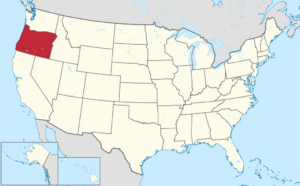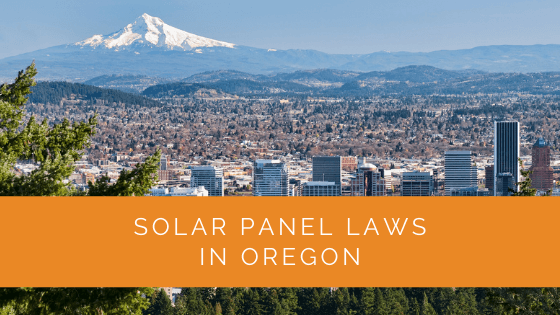 Oregon ranks 19th for its use of solar power. The state has good solar resources, and the government has been pushing for utilization. Oregon receives an average of 5 kilowatt-hours of sunlight per square meter daily. The Northeastern side receives less sunlight and can get up to 4 kilowatt-hours of sunlight per square meter a day. During the summer, the sunlight intensity increases, making solar a viable option in Oregon.
Oregon ranks 19th for its use of solar power. The state has good solar resources, and the government has been pushing for utilization. Oregon receives an average of 5 kilowatt-hours of sunlight per square meter daily. The Northeastern side receives less sunlight and can get up to 4 kilowatt-hours of sunlight per square meter a day. During the summer, the sunlight intensity increases, making solar a viable option in Oregon.
The state and utilities are pushing homeowners to invest in solar PV systems through incentives, tax cuts, and rebates. They are encouraging homes to be more energy-efficient and self-powered.
The energy market is mainly supplied with power from large hydroelectric power plants, the main ones being on the Columbia River. They produce nearly two-thirds of the state’s energy. Besides hydroelectric, the wind blows strongly; the state produces 4% of the nation’s wind power and has a geothermal potential of producing at least 2.2 gigawatts of power.
Oregon is a state that has invested in renewable sources, and they reap the benefits.
Due to the use of renewable sources to generate electricity, the state has cheap electricity rates. Consumers pay an average of $0.11 per kilowatt-hour. This is the major hindrance to going solar.
A 5kW solar panel installation in Oregon is enough for an ordinary house to meet all the energy needs. A 5kW system in Oregon might set you back about $22,000. When you factor in all the incentives and rebates, the payback period for a solar PV that size is 12 years. The long payback period is mainly attributed to the low cost of electricity.
Oregon has been a leader when it comes to utilizing renewable energy sources. They have formulated robust policies to encourage the adoption of clean energy practices. Here are the solar panel laws in Oregon.
Contents
Key Takeaways
- Oregon encourages solar power utilization with incentives and rebates driven by good solar resources and government support.
- The state has a Renewable Portfolio Standard (RPS) aiming to produce 25% of energy from renewables, benefiting homeowners with incentives for solar installation.
- Oregon offers strong net metering policies, allowing homeowners to earn credits by sending excess solar energy to the grid and deducting 30% of solar installation costs through the Federal Solar Tax Credit.
Oregon Renewable Portfolio Standard
A Renewable Portfolio Standard (RPS) policy guides utility energy generation. An RPS defines a percentage of electricity that must be generated using renewable means.
 Oregon was among the first states to introduce an RPS in 2007. The states aim to produce 25% of their energy from renewable resources.
Oregon was among the first states to introduce an RPS in 2007. The states aim to produce 25% of their energy from renewable resources.
An RPS greatly benefits homeowners who would like to upgrade to solar because utilities count residential energy production as part of their targets. This means utility providers offer incentives and rebates to homeowners to encourage them to invest in solar.
Oregon also has a solar carve-out. This carve-out only applies to solar farms and installations over 500 kW, more significant than a residential system.
Net Metering In Oregon
Oregon is a pioneer when it comes to solar power. It has a strong net metering policy that benefits homeowners wanting to upgrade to solar power. Net metering allows residents with solar panels to stay connected to the grid and enjoy the benefits.
When your solar power produces more energy than you need, the extra energy is sent to the grid and used to power other areas. When you send electricity to the grid, you earn credits, which can be used to offset your electricity bill.
At night, during the winter, or when it’s raining, your solar panel isn’t producing enough electricity due to low sunlight, so you can draw power from the grid to meet the deficit. The credits you earn are netted off your bill.
The state of Oregon requires that investor-owned utilities provide a 1-1 credit equal to the retail rate for each kWh of electricity your house sends to the grid. Cooperatives, municipal utilities, and utility districts must also comply with net metering. However, they credit customers at the avoided cost rate (wholesale price), which is lower than the retail rate.
Federal Solar Tax Credit
 Also known as the Investment Tax Credit (ITC), this is a nationwide incentive by the federal government to spur national adoption of solar power. This perk allows you to deduct 30% of the total cost of your installation from your taxes.
Also known as the Investment Tax Credit (ITC), this is a nationwide incentive by the federal government to spur national adoption of solar power. This perk allows you to deduct 30% of the total cost of your installation from your taxes.
This means that you can deduct 30% of the total costs incurred from the taxes due to the government when you acquire a solar PV system. You can reclaim the amount in your installation’s first year and return part of your investment.
This is the most considerable saving that can be seen from going solar. If you do not pay enough taxes to ensure you recover the amount in the first year, you can split the amount over to subsequent years till you’re fully compensated.
This tax cut is only available to people who buy a whole solar system at once, either by cash or using a solar loan. To achieve maximum savings, it is recommended that you purchase using cash. If you are low on capital, you can source a solar loan, redeem your tax cut, and even use the amount to pay for the loan’s first installments.
Oregon doesn’t offer any statewide tax credits to its residents.
Property Tax Exemption
The value of a house determines how much property taxes you are supposed to pay. Installing a solar PV system increases your house’s value on average by $15,000.
When the property value increases, the property taxes also increase. Oregon doesn’t tax solar in property taxes. You won’t have to pay for the increased value of your house by installing solar PV.
There’s no sales tax in Oregon, too.
Experience Solar Excellence with Us!
Trust in Solar Panels Network USA, where our seasoned experts deliver top-quality solar solutions for homes and businesses nationwide. With a legacy of countless successful installations and a commitment to sustainable energy, we’re your reliable partner in the solar journey. Ready for a brighter, eco-friendly future? Call us now at (855) 427-0058 and harness the power of the sun!
Map image by Wikimedia Commons User: TUBS / CC-BY-SA-3.0
About the Author
Solar Panels Network USA stands at the forefront of solar energy solutions, driven by a team of seasoned solar engineers and energy consultants. With over decades of experience in delivering high-quality solar installations and maintenance, we are committed to promoting sustainable energy through customer-centric, tailored solutions. Our articles reflect this commitment, crafted collaboratively by experts to provide accurate, up-to-date insights into solar technology, ensuring our readers are well-informed and empowered in their solar energy decisions.

